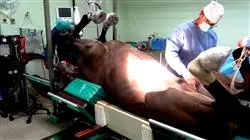University certificate
The world's largest faculty of veterinary medicine”
Introduction to the Program
A complete and total update in Equine Medicine and Surgery with the most complete and effective educational program in the online educational market"

Digestive pathologies are the main cause of death in domestic horses. Therefore, they constitute an area of equine medicine and surgery in constant progress and research and for which the clinician practicing ambulatory veterinary medicine must be equipped with a high level of specialization, to ensure the best results for their patients, ensuring at all times the knowledge of diagnostic tools and innovative and quality treatments.
Most digestive pathologies present with symptoms characteristic of what we call acute abdominal syndrome (AAS), or in other words, colicky pain. Addressing these problems is therefore always a challenge for the equine veterinarian. Some of them are mild, almost asymptomatic, but if not detected in time they can lead to loss of sporting performance, animal welfare disorders or serious systemic involvement. Others are conditions of extreme urgency, posing a real danger and even endangering the life of the animals.
They all encompass issues that require an advanced level of knowledge to be able to deal with situations that the specialist-qualified ambulatory clinician will have to deal with on a day-to-day basis.
These topics will deal with the in-depth study of the alterations related to the hematopoietic and immune system, identifiable through the laboratorial study of blood components and detectable through a hemogram and serum biochemistry.
An advanced analysis of the pathophysiological mechanism of allergies, as well as the latest trends in their diagnosis and treatment will be carried out.
Endotoxic shock, a serious complication secondary to certain pathologies of high incidence in equines and in which, without a clear and updated vision to stabilize the patient quickly and effectively, the animal's life can be compromised, will be addressed.
Join the elite, with this highly effective training and open new paths to your professional progress"
This Postgraduate diploma in Digestive and Blood Disorders in Horses. Nutrition and Extended Therapeutic Protocols in Ambulatory Practice offers you the characteristics of a course of high scientific, teaching and technological level. These are some of its most notable features:
- Latest technology in online teaching software
- Highly visual teaching system, supported by graphic and schematic contents that are easy to assimilate and understand
- Practical cases presented by practising experts
- State-of-the-art interactive video systems
- Teaching supported by telepractice
- Continuous updating and recycling systems
- Self-regulating learning: full compatibility with other occupations
- Practical exercises for self-evaluation and learning verification
- Support groups and educational synergies: questions to the expert, debate and knowledge forums
- Communication with the teacher and individual reflection work
- Content that is accessible from any fixed or portable device with an Internet connection
- Banks of complementary documentation permanently available, even after the end of the training
A complete training program that will allow you to acquire the most advanced knowledge in all the areas of intervention of the equine veterinarian"
Our teaching staff is made up of professionals from different fields related to this specialty. In this way, we ensure that we provide you with the training update we are aiming for. A multidisciplinary team of professionals trained and experienced in different environments, who will develop the theoretical knowledge in an efficient way, but, above all, will put at your service the practical knowledge derived from their own experience: one of the differential qualities of this training.
The efficiency of the methodological design of this Professional Master's Degree, enhances the student's understanding of the subject. Developed by a multidisciplinary team of e-learning experts, it integrates the latest advances in educational technology. In this way, you will be able to study with a range of easy-to-use and versatile multimedia tools that will give you the necessary skills you need for your specialization.
The design of this program is based on Problem-Based Learning: an approach that conceives learning as a highly practical process. To achieve this remotely, we will use telepractice: with the help of an innovative interactive video system, and learning from an expert, you will be able to acquire the knowledge as if you were actually dealing with the scenario you are learning about. A concept that will allow you to integrate and fix learning in a more realistic and permanent way.
You will learn to develop and advance in depth in the diseases that affect the digestive tract from the stomach to the rectum, assessing the stage of the pathologies that appear"

A unique, key and decisive training experience to boost your professional development"
Why study at TECH?
TECH is the world’s largest online university. With an impressive catalog of more than 14,000 university programs available in 11 languages, it is positioned as a leader in employability, with a 99% job placement rate. In addition, it relies on an enormous faculty of more than 6,000 professors of the highest international renown.

Study at the world's largest online university and guarantee your professional success. The future starts at TECH”
The world’s best online university according to FORBES
The prestigious Forbes magazine, specialized in business and finance, has highlighted TECH as “the world's best online university” This is what they have recently stated in an article in their digital edition in which they echo the success story of this institution, “thanks to the academic offer it provides, the selection of its teaching staff, and an innovative learning method aimed at educating the professionals of the future”
A revolutionary study method, a cutting-edge faculty and a practical focus: the key to TECH's success.
The most complete study plans on the university scene
TECH offers the most complete study plans on the university scene, with syllabuses that cover fundamental concepts and, at the same time, the main scientific advances in their specific scientific areas. In addition, these programs are continuously being updated to guarantee students the academic vanguard and the most in-demand professional skills. In this way, the university's qualifications provide its graduates with a significant advantage to propel their careers to success.
TECH offers the most comprehensive and intensive study plans on the current university scene.
A world-class teaching staff
TECH's teaching staff is made up of more than 6,000 professors with the highest international recognition. Professors, researchers and top executives of multinational companies, including Isaiah Covington, performance coach of the Boston Celtics; Magda Romanska, principal investigator at Harvard MetaLAB; Ignacio Wistumba, chairman of the department of translational molecular pathology at MD Anderson Cancer Center; and D.W. Pine, creative director of TIME magazine, among others.
Internationally renowned experts, specialized in different branches of Health, Technology, Communication and Business, form part of the TECH faculty.
A unique learning method
TECH is the first university to use Relearning in all its programs. It is the best online learning methodology, accredited with international teaching quality certifications, provided by prestigious educational agencies. In addition, this disruptive educational model is complemented with the “Case Method”, thereby setting up a unique online teaching strategy. Innovative teaching resources are also implemented, including detailed videos, infographics and interactive summaries.
TECH combines Relearning and the Case Method in all its university programs to guarantee excellent theoretical and practical learning, studying whenever and wherever you want.
The world's largest online university
TECH is the world’s largest online university. We are the largest educational institution, with the best and widest online educational catalog, one hundred percent online and covering the vast majority of areas of knowledge. We offer a large selection of our own degrees and accredited online undergraduate and postgraduate degrees. In total, more than 14,000 university degrees, in eleven different languages, make us the largest educational largest in the world.
TECH has the world's most extensive catalog of academic and official programs, available in more than 11 languages.
Google Premier Partner
The American technology giant has awarded TECH the Google Google Premier Partner badge. This award, which is only available to 3% of the world's companies, highlights the efficient, flexible and tailored experience that this university provides to students. The recognition as a Google Premier Partner not only accredits the maximum rigor, performance and investment in TECH's digital infrastructures, but also places this university as one of the world's leading technology companies.
Google has positioned TECH in the top 3% of the world's most important technology companies by awarding it its Google Premier Partner badge.
The official online university of the NBA
TECH is the official online university of the NBA. Thanks to our agreement with the biggest league in basketball, we offer our students exclusive university programs, as well as a wide variety of educational resources focused on the business of the league and other areas of the sports industry. Each program is made up of a uniquely designed syllabus and features exceptional guest hosts: professionals with a distinguished sports background who will offer their expertise on the most relevant topics.
TECH has been selected by the NBA, the world's top basketball league, as its official online university.
The top-rated university by its students
Students have positioned TECH as the world's top-rated university on the main review websites, with a highest rating of 4.9 out of 5, obtained from more than 1,000 reviews. These results consolidate TECH as the benchmark university institution at an international level, reflecting the excellence and positive impact of its educational model.” reflecting the excellence and positive impact of its educational model.”
TECH is the world’s top-rated university by its students.
Leaders in employability
TECH has managed to become the leading university in employability. 99% of its students obtain jobs in the academic field they have studied, within one year of completing any of the university's programs. A similar number achieve immediate career enhancement. All this thanks to a study methodology that bases its effectiveness on the acquisition of practical skills, which are absolutely necessary for professional development.
99% of TECH graduates find a job within a year of completing their studies.
Postgraduate Diploma in Digestive and Blood Disorders in Horses. Nutrition and Extended Therapeutic Protocols in Ambulatory Practice
TECH Global University presents the Postgraduate Diploma in Digestive and Blood Disorders in Horses, an educational program designed especially for veterinary professionals interested in equine health care. Through our 6-month online classes, you will have the opportunity to broaden your knowledge in the diagnosis, treatment and prevention of digestive and blood diseases in horses, as well as in nutrition and therapeutic protocols in ambulatory practice. Our online learning platform will provide you with access to teaching materials, interactive resources and debate sessions with experts in the field of equine medicine.
Expand your knowledge of nutrition and therapeutic protocols in ambulatory practice with TECH
In this Postgraduate Diploma, you will gain up-to-date knowledge on the nutritional requirements of horses and how to tailor their nutrition based on their specific needs. You will also learn how to design therapeutic protocols to address digestive and blood pathologies through dietary changes and appropriate supplementation. You will explore in depth the different pathologies that affect the digestive and blood systems of horses, including gastrointestinal disorders, liver diseases, nutrient absorption problems and coagulation disorders. Upon completion of the Postgraduate Diploma program, you will receive a Postgraduate Diploma certificate, endorsed by TECH. This official recognition will support your skills and knowledge, giving you competitive advantages in your career as an equine veterinarian.







